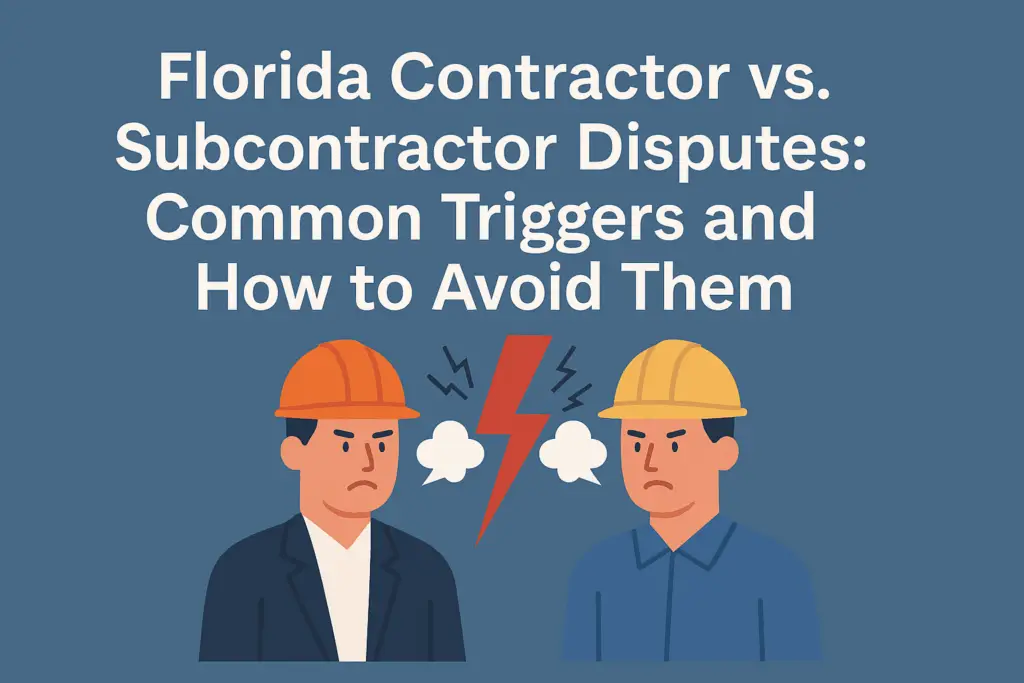Disputes between general contractors and subcontractors are among the most common legal issues in Florida’s construction industry. From payment delays to scope disagreements, even the most experienced professionals can find themselves in conflict when expectations aren’t clearly set from the beginning.
At Douglas Firm, a trusted Florida construction attorney, we represent both contractors and subcontractors in disputes over performance, payments, and contract compliance. Whether you are protecting lien rights, defending against DBPR complaints, or litigating a construction contract, our firm provides tailored legal counsel across all stages of a project.
Here are the most common causes of conflict — and how to reduce your risk of litigation or DBPR complaints.
1. Payment Delays and Pay-When-Paid Clauses
A leading cause of subcontractor frustration is delayed or withheld payment. Many general contractors use “pay-when-paid” clauses to protect themselves from delays caused by the project owner. But Florida courts distinguish between “pay-when-paid” and “pay-if-paid” clauses, and the wrong wording can invalidate your protections.
Avoid it:
- Contractors should use carefully drafted payment clauses that reflect their actual risk.
- Subcontractors should negotiate or at least understand the timing and conditions for payment.
Related Resource: Account Receivable Collections & Payment Disputes
2. Disputes Over Scope of Work
A common trigger for disagreement is when subcontractors believe they are being asked to do extra work beyond the agreed scope, or when contractors believe the sub has underperformed. These conflicts often stem from vague or incomplete contract language.
Avoid it:
- Use detailed scopes of work and attach drawings or specifications when available.
- Require written change orders for any adjustments in scope.
- Document all communications in writing.
Related Resource: How to Draft a Legally Enforceable Construction Contract in Florida
3. Change Order Disputes
Verbal approvals, unclear authority, or undocumented changes often lead to costly misunderstandings. Contractors may feel changes weren’t authorized; subcontractors may feel they performed work in reliance on approval.
Avoid it:
- Establish a clear process for issuing and approving change orders.
- Use signed documents, not emails or texts.
- Clarify who has authority to authorize changes.
Related Resource: Construction and Electrical Qualifier Agreements
4. Project Delays and Coordination Failures
Contractors often blame subcontractors for slowing down the job; subcontractors claim they were held up by poor coordination, late material deliveries, or bottlenecks caused by others. These disputes are difficult to resolve without good documentation.
Avoid it:
- Set clear project schedules.
- Require daily logs or progress reports.
- Plan for delays with contract language addressing extensions and liquidated damages.
5. Improper or Missing Lien Waivers
Subcontractors often provide lien waivers with each payment application. If language is overly broad, it may waive rights unintentionally. Contractors, on the other hand, rely on lien waivers to protect the project from future claims.
Avoid it:
- Use conditional and unconditional waivers as appropriate.
- Subcontractors should review waiver language carefully.
- Contractors should collect lien waivers in the correct sequence with payments.
Related Resource: Florida Lien Machine
6. License or Compliance Issues
If a subcontractor is not properly licensed for the scope of work, or if a qualifier is not actively involved as required by DBPR, the contractor can be held liable — and the subcontractor may not be entitled to payment.
Avoid it:
- Verify licenses and insurance before hiring subs.
- Ensure qualifiers are aware of and involved in operations.
- Know your obligations under Florida law.
Related Resource: DBPR Complaints | Unlicensed Contracting Defense
Conclusion
Contractor vs. subcontractor disputes don’t have to result in lawsuits, liens, or DBPR complaints. With well-drafted contracts, clear communication, and awareness of your legal obligations, you can reduce the likelihood of conflict and protect your bottom line.
As an experienced Florida construction attorney, Douglas Firm helps construction professionals across the state resolve disputes and draft agreements that minimize risk. Whether you’re a contractor, subcontractor, or developer, we offer proactive legal solutions that keep your projects on track.
Douglas Firm — Construction Law Counsel for Florida’s Contractors and Subcontractors.
